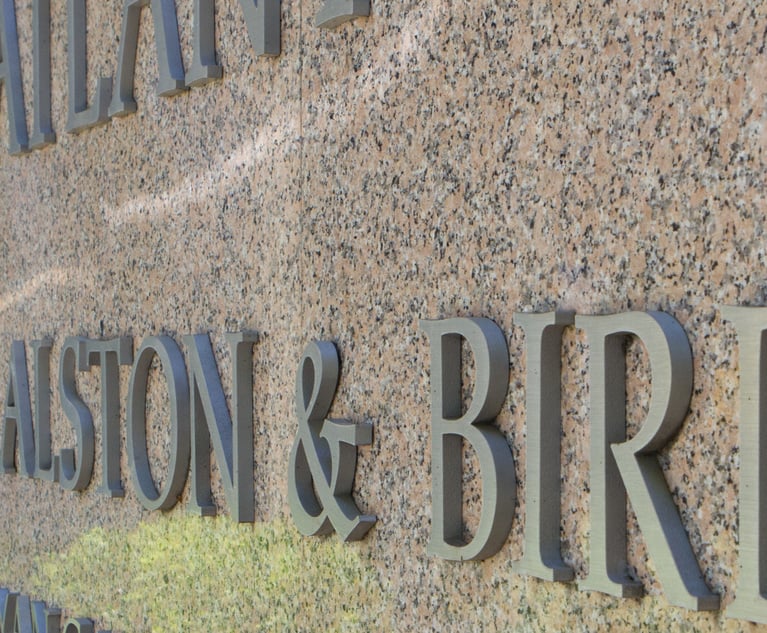 John F. Meyers
John F. MeyersHow Rainmaking for a Big Firm Led to a Two-Year Bar Suspension
The transcript of the 2015 disciplinary hearing offers the deepest public glimpse of an attorney's long career in the law—and how he believed he had done nothing wrong.
December 18, 2017 at 03:20 PM
7 minute read
John F. Meyers was a rainmaker at Seyfarth Shaw, forging and maintaining client relationships—and billing hundreds of thousands of dollars every month, the former equity partner in Atlanta once recounted.
Meyers had about 30 regular clients at Seyfarth, where the veteran lawyer—he helped build the firm's Atlanta office—was on the labor and employment team. He estimated his hands touched $5 million to $6 million in business annually.
All of that came to a sudden stop in 2012, when one of Seyfarth's big clients, the New Jersey-based manufacturer J.M. Huber Corp., raised concerns about Meyers' billing. A Huber in-house lawyer confronted Seyfarth, and Meyers was questioned at a meeting at the firm's headquarters in Chicago.
The Georgia Supreme Court last week suspended Meyers—by then a Barnes & Thornburg partner in Atlanta—for two years for professional misconduct related to invoices sent to Huber for work that did not involve the company. In reality, those invoices were for work done for the private clients of one of Huber's corporate counsel.
“A lawyer cannot steal from a client. And that's just what the evidence will show respondent did by billing Huber for work that was not Huber work,” Jonathan Hewett, senior assistant general counsel of the Georgia bar, said at a disciplinary hearing in 2015.
Meyers has neither spoken publicly about the ethics case nor returned messages seeking comment. The transcript of the 2015 disciplinary hearing offered the deepest public glimpse of his long career in the law—and how he believed he had done nothing wrong. At the hearing, Meyers said he was relying on the assurance from a Huber in-house lawyer named Michael DiTano, who was using Seyfarth lawyers to perform legal services for private clients.
DiTano faced his own disciplinary action in Florida and Georgia for his role in submitting altered bills to Huber, and he surrendered his license to practice law for duping the company. He died in October at age 54.
“I trusted Mike,” Meyers said at the ethics hearing, according to a transcript. “Mike said he had the full blessing of the company, that that was part of his job duties and that it was going to benefit Huber through these form files. It was going to benefit Huber as Huber went into other areas of business.”
Meyers resigned from Seyfarth in August 2012, and the firm—where he had been employed since 1993—reported him to the Georgia bar. Barnes & Thornburg on Sept. 5, 2012, announced its hiring of Meyers.
It's unclear whether the firm knew there were any questions about Meyers' billing at the time he was hired. Stuart Johnson, the Barnes & Thornburg managing partner in Atlanta, didn't return messages seeking comment.
“As a talented practitioner who is well-connected in the Atlanta business community, John is a perfect fit for us and will play a key role as we continue to strategically enhance and grow those capabilities in this market,” Johnson said in a news release in 2012.
Johnson testified at the disciplinary hearing that telling the state bar and an attorney for Meyers that he recruited Meyers to join Barnes & Thornburg. “John is sort of a prototypical—he's what a partner should be in a law firm like ours,” Johnson said then. Meyers, he said, was “unselfish in terms of participating with other folks in helping to grow and nurture and expand our practice. You ask John to do something and the answer is always yes.”
In a statement last week, Barnes & Thornburg said: “The conduct underlying the complaint against Mr. Meyers occurred before he joined [the firm]. We are committed to providing the best possible service to our clients and, above all, this includes the highest standards of ethical and professional conduct.”
Meyers said at the hearing that the disciplinary action against him was part of the reason he left Seyfarth.
“I mean, I'd already made up my mind I was going to leave,” he said. Meyers said he was talking to six firms during the summer of 2012 “that had sizable practices” in Atlanta. Meyers, before joining Seyfarth, was a labor and employment associate in Gibson, Dunn & Crutcher's San Francisco and Newport Beach offices.
'This is Normal Business'
Huber in 2000 became a regular client of Meyers'—generating anywhere from $10,000 to $100,000 in work per month depending on the pending matters. In addition to providing labor and employment advice, Meyers' work included discrimination litigation in various states.
Meyers' contact at Huber was DiTano, and it was DiTano who approached Meyers about Seyfarth doing work for his private clients.
Such services—in one instance, for what Meyers was told was a trucking company owned by a professional athlete—included preparing letters of intent and purchase and acquisition agreements, as well as reviewing vendor or supplier agreements. Meyers performed similar work for another private client, Goldberg's Deli.
According to testimony at the ethics hearing, DiTano assured Meyers that such documents, although prepared and reviewed for private clients, would benefit Huber because they would educate DiTano about how to handle those types of matters for the company.
The work was “things that Mike said were the core of his practice at Huber and that this would benefit him greatly, that he would use these forms,” Meyers testified.
Meyers said he did not see anything amiss with Seyfarth doing work for DiTano's clients. It was all a part of being a rainmaker at the firm, he said.
“I've seen other clients have private law practices on the side as well or in conjunction with what they do, so at the time I really didn't think about it. I could tell Mike was frustrated with his comp because of the recession,” Meyers said. “You could just read it in his face that he felt that he needed to be able to go do more things because his comp package was shrinking. So I just viewed it as this—this is normal business.”
Andrew Sims, who owns a consulting firm in Atlanta, testified on Meyers' behalf, saying a mutual friend introduced the pair in early 2012. Sims, he said, thought highly enough of Meyers' legal work that he referred a West Coast-based client of his to Meyers.
“John and Barnes & Thornburg have been a great resource for them,” Sims said. He added: “John's attitude is really unlike most people. It's to try and help people network with people, help support people, effectively putting others before trying to generate figures just for himself.”
A special master recommended Meyers be disbarred for professional misconduct. But the Georgia Supreme Court settled on a two-year suspension instead.
The ethics case marked the first in Meyers' long career.
“Our position is that John Meyers is an honest guy that did what lawyers in that position do,” Meyers' lawyer, Lester Tate, said during the hearing before the special master, David Anthony LaMalva. “And our defense in this case … is actual innocence. This is not a technical defense. This is a case where John had been dealing with an inside general counsel for a long period of time and he did what the inside general counsel told him to do.”
This content has been archived. It is available through our partners, LexisNexis® and Bloomberg Law.
To view this content, please continue to their sites.
Not a Lexis Subscriber?
Subscribe Now
Not a Bloomberg Law Subscriber?
Subscribe Now
NOT FOR REPRINT
© 2025 ALM Global, LLC, All Rights Reserved. Request academic re-use from www.copyright.com. All other uses, submit a request to [email protected]. For more information visit Asset & Logo Licensing.
You Might Like
View All
Few Atlanta-Centric Law Firms Expected to Pay Associate Bonuses at Market Scale
5 minute read

Lewis Brisbois Attempts Revamp After Mass Defections, Email Scandal
Trending Stories
- 1People in the News—Jan. 9, 2025—Rawle & Henderson, Armstrong Teasdale
- 2Thinking Outside the RFP: AI’s Impact Beyond Scaling Review Efficiency
- 3Special Series Part 4: The Statutory Guardrails Impermissibly Bind Future Legislatures
- 4New York Court of Appeals Blocks Trump Attempt to Stay Friday Sentencing
- 5'Self-Diagnosed Nickel Allergy' Fails to Find Success in Med-Mal Suit, 8th Circuit Rules
Who Got The Work
Michael G. Bongiorno, Andrew Scott Dulberg and Elizabeth E. Driscoll from Wilmer Cutler Pickering Hale and Dorr have stepped in to represent Symbotic Inc., an A.I.-enabled technology platform that focuses on increasing supply chain efficiency, and other defendants in a pending shareholder derivative lawsuit. The case, filed Oct. 2 in Massachusetts District Court by the Brown Law Firm on behalf of Stephen Austen, accuses certain officers and directors of misleading investors in regard to Symbotic's potential for margin growth by failing to disclose that the company was not equipped to timely deploy its systems or manage expenses through project delays. The case, assigned to U.S. District Judge Nathaniel M. Gorton, is 1:24-cv-12522, Austen v. Cohen et al.
Who Got The Work
Edmund Polubinski and Marie Killmond of Davis Polk & Wardwell have entered appearances for data platform software development company MongoDB and other defendants in a pending shareholder derivative lawsuit. The action, filed Oct. 7 in New York Southern District Court by the Brown Law Firm, accuses the company's directors and/or officers of falsely expressing confidence in the company’s restructuring of its sales incentive plan and downplaying the severity of decreases in its upfront commitments. The case is 1:24-cv-07594, Roy v. Ittycheria et al.
Who Got The Work
Amy O. Bruchs and Kurt F. Ellison of Michael Best & Friedrich have entered appearances for Epic Systems Corp. in a pending employment discrimination lawsuit. The suit was filed Sept. 7 in Wisconsin Western District Court by Levine Eisberner LLC and Siri & Glimstad on behalf of a project manager who claims that he was wrongfully terminated after applying for a religious exemption to the defendant's COVID-19 vaccine mandate. The case, assigned to U.S. Magistrate Judge Anita Marie Boor, is 3:24-cv-00630, Secker, Nathan v. Epic Systems Corporation.
Who Got The Work
David X. Sullivan, Thomas J. Finn and Gregory A. Hall from McCarter & English have entered appearances for Sunrun Installation Services in a pending civil rights lawsuit. The complaint was filed Sept. 4 in Connecticut District Court by attorney Robert M. Berke on behalf of former employee George Edward Steins, who was arrested and charged with employing an unregistered home improvement salesperson. The complaint alleges that had Sunrun informed the Connecticut Department of Consumer Protection that the plaintiff's employment had ended in 2017 and that he no longer held Sunrun's home improvement contractor license, he would not have been hit with charges, which were dismissed in May 2024. The case, assigned to U.S. District Judge Jeffrey A. Meyer, is 3:24-cv-01423, Steins v. Sunrun, Inc. et al.
Who Got The Work
Greenberg Traurig shareholder Joshua L. Raskin has entered an appearance for boohoo.com UK Ltd. in a pending patent infringement lawsuit. The suit, filed Sept. 3 in Texas Eastern District Court by Rozier Hardt McDonough on behalf of Alto Dynamics, asserts five patents related to an online shopping platform. The case, assigned to U.S. District Judge Rodney Gilstrap, is 2:24-cv-00719, Alto Dynamics, LLC v. boohoo.com UK Limited.
Featured Firms
Law Offices of Gary Martin Hays & Associates, P.C.
(470) 294-1674
Law Offices of Mark E. Salomone
(857) 444-6468
Smith & Hassler
(713) 739-1250







